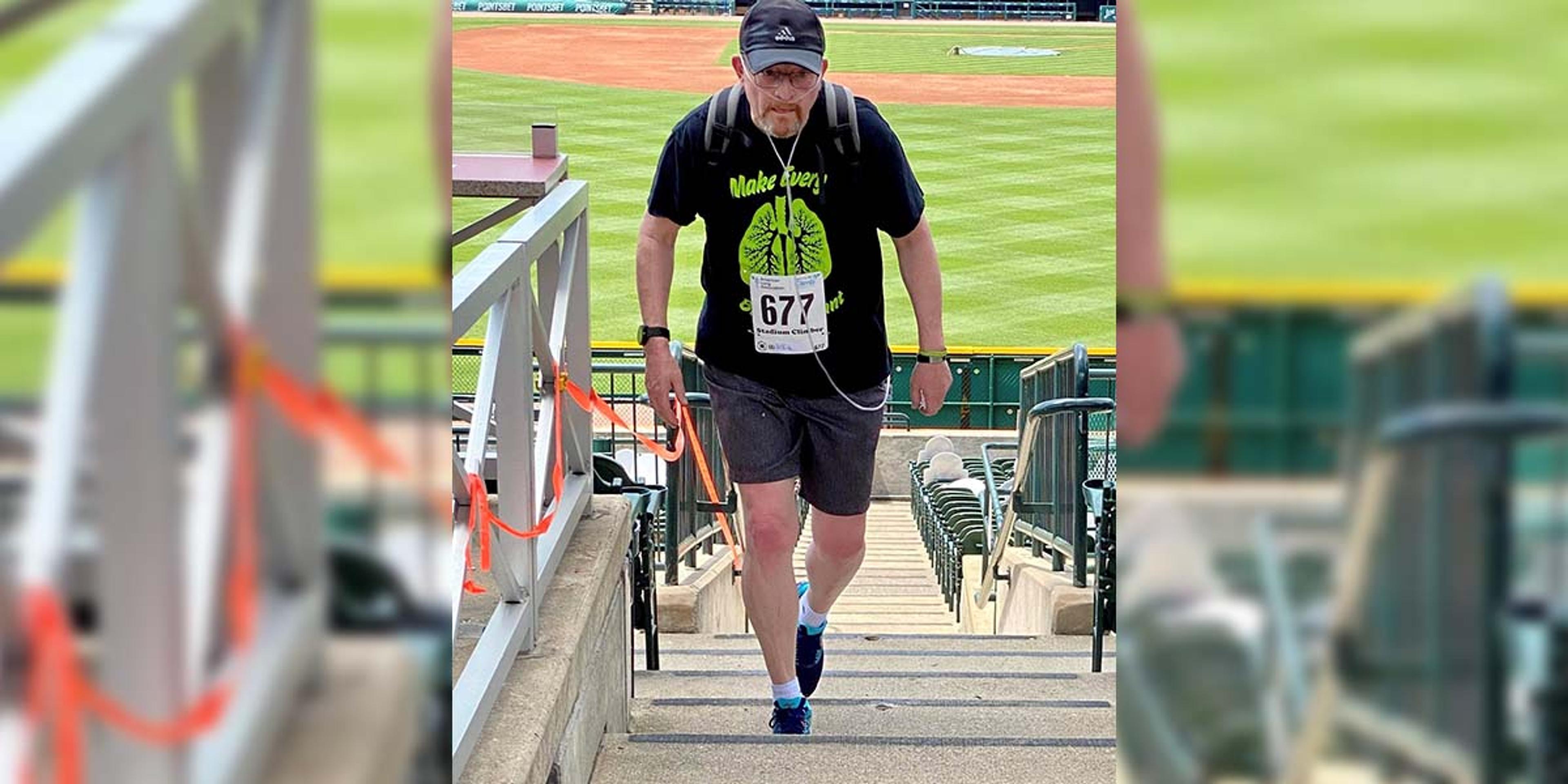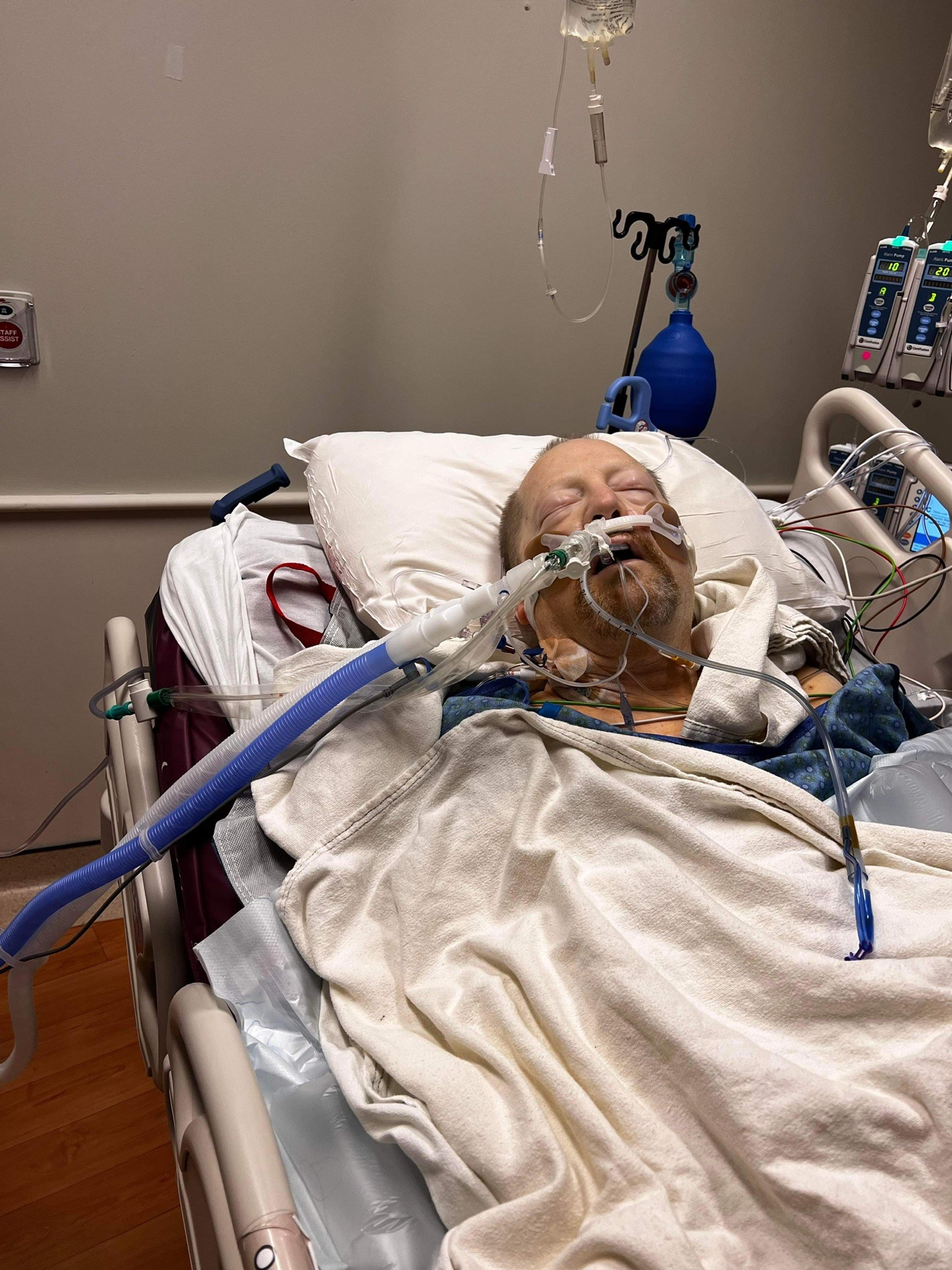Battle Creek Double Lung Transplant Recipient Credits Exercise for Return to Normalcy
Jake Newby
| 4 min read

Severe lung scarring couldn’t stop Battle Creek resident Doug Wright from conquering the annual “Fight For Air Climb” at Comerica Park the past few years, albeit slowly and methodically. Then in 2022, when he participated in the stadium-wide test of endurance with a new set of lungs, Wright felt as if he was zigging and zagging through the ballpark stands after removing a weighted vest.
“I did finish sooner than in past years,” said Wright, a Blue Cross Blue Shield of Michigan (BCBSM) member. “I felt a lot better. I didn’t feel restricted. My lungs performed beautifully during the stair climb. My legs were still trying to catch up, but the lungs did great.”
A lifelong runner, Wright’s endurance, stamina, and overall quality of like took a turn for the worse in 2012.
“I started to really slow down and have trouble breathing while I was running,” Wright said.
Wright was diagnosed with idiopathic pulmonary fibrosis, an uncurable lung disease, caused by his rheumatoid arthritis.
“Typically, we think about rheumatoid arthritis affecting the joints and connective tissue, but it also can affect the lungs, causing scarring,” Wright added.
For six years, Wright said he “bumped along” with the combination of light exercise – he couldn’t run, but he walked regularly – and a medication used to treat idiopathic pulmonary fibrosis.

His lung capacity decreased significantly toward the end of 2020. It was around that time that Wright began to rely heavily on supplemental oxygen, leaning on it to complete daily activities like showering and using the bathroom.
His pulmonologist referred Wright to the University of Michigan transplant team in 2021, where Wright wound up receiving a successful double lung transplant in November of that year. Supplemental oxygen became such a crutch for Wright in the months leading up to his procedure that he almost didn’t trust the new lungs at first.
“I was reluctant to give up the oxygen for a few days,” he recalled. “I had become so dependent on it for so long.”
But in less than a week Wright waned off the oxygen and noticed he was breathing better than he had in almost a decade. That’s when the feelings of gratitude washed over him.
“It’s really been a life-changer to approach the sort of physical activity levels that I struggled to get to while I was on oxygen,” Wright said. “You’re limited, you’re tied down. A lot of people don’t realize how important oxygen is. If you don’t use the oxygen when you’re supposed to, you subject yourself to organ damage, brain damage, those sort of things. There were many times before the surgery where my oxygen dropped so low that I wasn’t functioning correctly. So, having these new lungs and getting some sense of normalcy was wonderful.”
Wright said his wife, Linda, and the U of M transplant team helped get him through the darkest period of his life. He said he's also deeply grateful for his donor. Now he’s back to breaking a sweat with regularity, participating in 5k’s, 10k’s, the Comerica Park stadium climb and more.
“We did a 5k before the stair climb in May, and we just did one recently in Kalamazoo,” Wright said. “I’m just walking them but I’m walking them really fast.”
Advice for those with debilitating lung problems
“You gotta make the best with what you have,” Wright said, reflecting on his decade-long lung struggles. “Do the best you can with your quality of life. A lot of that may revolve around oxygen, because you simply gotta have it. I think that’s sometimes an understated component of this. We’ve seen people on TV or in commercials (with oxygen) without really understanding how important it is.”
To those facing circumstances similar to Wright’s, he advised staying as active as possible for as long as possible.
“I think one of the reasons why I managed those years OK is because I really tried to stay active as much as I could,” he said. “I walked a couple of half-marathons early on with my oxygen tank. Because I thought I had to stay active and keep moving. And you have to stay healthy in other ways too, not just through exercise. You gotta take care of yourself and do what the doctors are telling you.”
Wright has a close friend who isn’t as fortunate as he was in becoming eligible for a transplant and waiting only a short time to receive it. He hopes breakthrough research will develop sooner than later, because as he says, “there’s not enough lungs to go around.”
“I got a friend who is wrapped up in this and her health is going downhill, and I hate to see that,” he said. “The work the American Lung Association does to include research needs to continue so that we can find a cure and a pathway to better outcome and qualities of life.”
Photo credit: Doug Wright
Related:





